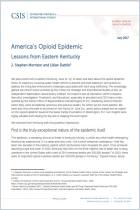More than 30 years after the introduction of OxyContin, America’s overdose crisis is severe and doesn’t appear to have an end in sight. Many innovators are keen to destigmatize addiction and reach those in its clutches where they live. Still, those deemed responsible for its tragedy have yet to address it. Author Beth Macy highlights the players on the ground of this catastrophic drama, including the lawyers and activists with a stake in the scene, the bereaved family members of those lost to drugs and those many individuals who have taken it upon themselves to effect change.
The American overdose crisis has its roots in rampant OxyContin overprescription and economic devastation.
Almost every American zip code has suffered its share of overdose deaths and coped with worsening mortality rates. In fact, by the late 1990s, everywhere in the United States was hampered by rampant overprescribing of opioids.
According to government research, the cost of overdose deaths in health expenses, reduced productivity and other losses equals a staggering $1 trillion per year. That America leads the world in medical research spending doesn’t negate the reality that it has the worst outcomes for addiction and mental health.
Citizens have stepped in to help others struggling with overdoses where governmental systems have failed.
There is reason for hope at the root of this tangled tale of public health, politicians, racial and socioeconomic discrimination, Big Pharma, and dark money. In many of the areas where Purdue’s overprescription epidemic was most prevalent, treatment of the sickest was undertaken mainly by volunteers.
The Olive Branch Ministry in Hickory, North Carolina, offers food and hygiene supplies, syringe...
Beth Macy is a Virginia-based journalist, the author of Dopesick: Dealers, Doctors, and the Drug Company That Addicted America, and an executive producer and co-writer on Hulu’s Peabody Award-winning Dopesick series.

















Comment on this summary